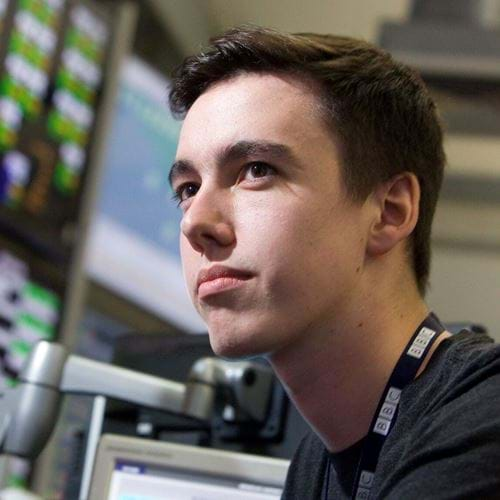Pause carousel
Play carousel

"Abertay felt really unique in how accessible all the students and lecturers from all courses were."Ben Newcombe | School of Design and Informatings | BSc (Hons) Computing, 2017
My degree definitely helped give me the confidence to apply for a graduate role at the BBC, and specific modules have greatly helped me in both personal projects and as I rotate around different teams at work. Specifically, the mobile app development module helped me gain hands-on experience building apps in a way that really rewarded experimenting and trying out new ideas. Similarly, languages and compilers, a module which introduces many different concepts utilised by different programming languages, and delves into how compilers might reason about those concepts, has established a really good framework with which to view all the different languages and technologies I’ve since encountered. It also really helps highlight different computing principles and approaches than what you might have experienced in school, college or university up to that point.
I was pretty proactive in applying for jobs during fourth year, and in contributing to software projects outside of university to build up more experience. I’d really recommend personal or non-work projects like this — in the best case, you can work on a really successful app, with friendly maintainers who are extremely keen to help you learn. In my case, we started with just three people, working on a free project that we loved, but ended up with tens of thousands of users.
I ended up interviewing for the BBC in February, and was able to complete the rest of my final year project with the comfort of knowing I’d already secured a role — a nice thing to remind yourself of when you’re in the midst of fourth year deadlines!
I found there was a really close-knit community at Abertay. There’s a good range of societies and events. The faculty go to a lot of effort to embrace events like Global Game Jam, and it’s doubly fun seeing students from all courses form teams to have a go, no matter their experience. All of this allows you to really quickly establish friends from a range of different courses.
In everything I’ve heard from alumni of Abertay and other universities, Abertay feels really unique in how accessible all the students and lecturers from all courses are. Whitespace really does act like a hub, allowing you to bump into, make connections and learn from people in other disciplines.
Dundee as a city always felt very welcoming and inclusive to me. Everything feels extremely nearby, and there are great opportunities for catching art, film and games projects at DCA, Makerspace and similar. Dundee has a real indie maker community, and I can only imagine all of this feels even more true at the moment with the opening of the V&A, which I’m very jealous to have missed!